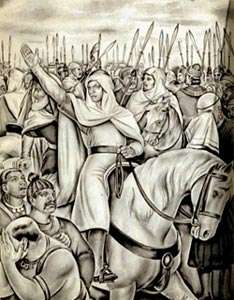AD 711
Year 711 (DCCXI) was a common year starting on Thursday (link will display the full calendar) of the Julian calendar. The denomination 711 for this year has been used since the early medieval period, when the Anno Domini calendar era became the prevalent method in Europe for naming years.
| Millennium: | 1st millennium |
|---|---|
| Centuries: | |
| Decades: | |
| Years: |
|
| AD 711 by topic |
|---|
| Leaders |
| Categories |
|
| Gregorian calendar | 711 DCCXI |
| Ab urbe condita | 1464 |
| Armenian calendar | 160 ԹՎ ՃԿ |
| Assyrian calendar | 5461 |
| Balinese saka calendar | 632–633 |
| Bengali calendar | 118 |
| Berber calendar | 1661 |
| Buddhist calendar | 1255 |
| Burmese calendar | 73 |
| Byzantine calendar | 6219–6220 |
| Chinese calendar | 庚戌年 (Metal Dog) 3407 or 3347 — to — 辛亥年 (Metal Pig) 3408 or 3348 |
| Coptic calendar | 427–428 |
| Discordian calendar | 1877 |
| Ethiopian calendar | 703–704 |
| Hebrew calendar | 4471–4472 |
| Hindu calendars | |
| - Vikram Samvat | 767–768 |
| - Shaka Samvat | 632–633 |
| - Kali Yuga | 3811–3812 |
| Holocene calendar | 10711 |
| Iranian calendar | 89–90 |
| Islamic calendar | 92–93 |
| Japanese calendar | Wadō 4 (和銅4年) |
| Javanese calendar | 604–605 |
| Julian calendar | 711 DCCXI |
| Korean calendar | 3044 |
| Minguo calendar | 1201 before ROC 民前1201年 |
| Nanakshahi calendar | −757 |
| Seleucid era | 1022/1023 AG |
| Thai solar calendar | 1253–1254 |
| Tibetan calendar | 阳金狗年 (male Iron-Dog) 837 or 456 or −316 — to — 阴金猪年 (female Iron-Pig) 838 or 457 or −315 |

Muhammad ibn Qasim leading his troops in battle
Qasim's expedition into northwestern India
Events
By place
Byzantine Empire
- Philippicus incites the inhabitants of Cherson to revolt, with the help of the Khazars. Emperor Justinian II sallies forth from Constantinople to oppose the rebels in the Crimea. Philippicus defeats the Byzantine forces in northern Anatolia, and seizes the capital. He is proclaimed emperor and Justinian is executed, ending the house of Heraclius, that has ruled since 610.
- December – Upon hearing the news of Justinian's death, Anastasia, Justinian's mother, escapes with Justinian's 6-year-old son Tiberius to the sanctuary at the St. Mary's Church (Constantinople). She is pursued by Philippicus' henchmen, who drag the child from the altar and murder him outside the church. It is unknown what became of Justinian's wife, Theodora.
Europe
- Ansprand, duke of Asti, returns from exile to Italy with a large Bavarian army. Many Austrians (with troops of Venetia) join him in support. King Aripert II, who has usurped the throne (see 701), is defeated and tries to escape from Pavia to Gaul with his treasury, but he drowns in the Ticino River. He is the last Bavarian to wear the Iron Crown (approximate date).
- Peaceful relations between Franks and Frisians are consolidated by the marriage of Pepin of Herstal's son Grimoald to Theudesinda, daughter of King Radbod.
- April 23 – King Childebert III dies after a 16-year reign, and is succeeded by his son Dagobert III as ruler of Austrasia. Pepin of Herstal becomes his regent.
Britain
- Dux Berhtfrith leads a Northumbrian campaign against the Picts, and defeats them in Manaw Gododdin (modern Scotland) (approximate date).
Arabian Empire
- April 27 – Umayyad conquest of Hispania: Muslim troops (7,000 men) led by Tariq ibn Ziyad land at Gibraltar, and begin their invasion of the Iberian Peninsula (now Spain and Portugal). Tariq begins his Islamic conquest of the Visigothic Kingdom, which during the decade he occupies and brings under Umayyad sovereignty.
- July 19 – Battle of Guadalete: The Muslim Arabs defeat the Visigothic army (33,000 men) under King Roderick, who dies in battle. The Visigoth capital of Toledo opens its city gates; Tariq ibn Ziyad sends Moorish detachments to capture the cities of Córdoba and Seville (Andalusia).
Asia
- After pirates plunder an Arab ship near the mouth of the Indus River (Pakistan), Uamayyad Arabs under Muhammad ibn Qasim invade India with 10,000 men and 6,000 horses, establishing a sultanate in Sindh. Qasim sends expeditions to Surashtra, where he makes peaceful treaty settlements with the Rashtrakuta.[1]
- Muhammad ibn Qasim captures the fortress city of Multan after a long siege, and raids with his forces the Punjab region, with only light Muslim casualties.[2]
By topic
Births
- Malik ibn Anas, Arab scholar (approximate date)
- Su Zong, emperor of the Tang Dynasty (d. 762)
Deaths
- April 23 – Childebert III, king of the Franks
- Aripert II, king of the Lombards (or 712)
- Justinian II, Byzantine emperor (b. 669)
- K'inich K'an Joy Chitam II, ruler of Palenque
- Roderic, king of the Visigoths (or 712)
- Seachnasach, king of Uí Maine (Ireland)
- Tiberius, son of Justinian II (b. 705)
gollark: I have an app which tells me which satellites it's using.
gollark: Yep!
gollark: In any case, they have perfectly functional GPS receiver hardware which can also use cell towers.
gollark: SOme of them.
gollark: Phones also have barometers now.
References
- Alexander Berzin, Part I: The Umayyad Caliphate (661 - 750 CE), "The First Muslim Incursion into the Indian Subcontinent". The Historical Interaction between the Buddhist and Islamic Cultures before the Mongol Empire Last accessed. September 11, 2007.
- Wink (2004), pp 201–205
This article is issued from Wikipedia. The text is licensed under Creative Commons - Attribution - Sharealike. Additional terms may apply for the media files.